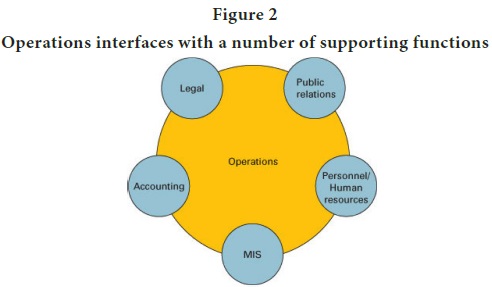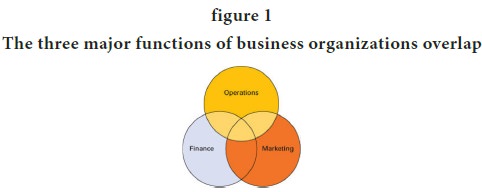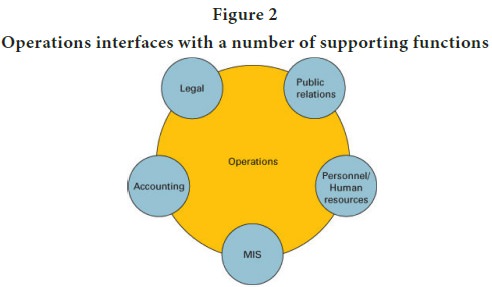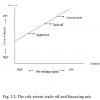Operations Management - Introduction to Operations Management
Role of Operations Management
Posted On :

Even if you want to specialize in the domains like, finance or marketing, still you have to study a course on Operations Management.
Role of Operations
Management
Even if you want to specialize in the domains like, finance or marketing, still you have to study a course on Operations Management. There are number of reasons to quote; but the most important among them is that 50 percent or more of all jobs are in operations management or related fields. Moreover, recall the image of a business organization as a car, with operations as its engine, in order for that car to function properly, all of the parts must work together. So, too, all of the parts of a business organization must work together in order for the organization to function successfully.
For the successful functioning of the organisation, members of various functional domains shall work together; thus, it is very much essential for all members of the organization to understand not only their own role in their functional specialization, but, they also understand the roles of others.
This is precisely why all business students, regardless of their majors, are required to take a common core of courses that will enable them to learn about all aspects of business. Because operations management is central to the functioning of all business organizations, it is included in the core of courses business students are required to take.
And even though individual courses have a narrow focus (e.g., accounting, marketing), in practice, there is significant interfacing and collaboration among the various functional areas, involving exchange of information and cooperative decision making. For example, although the three primary functions in business organizations perform different activities, many of their decisions impact the other areas of the organization. Consequently, these functions have numerous interactions, as depicted by the overlapping circles shown in diagram.

Finance and operations management personnel cooperate by exchanging information and expertise in various activities the following are the illustrative but not an exhaustive list.
Budgeting: Budgets must be periodically prepared to plan financial requirements. Budgets must sometimes be adjusted, and performance relative to a budget must be evaluated.
Economic analysis of investment proposal: Evaluation of alternative investments in plant and equipment requires inputs from both operations and finance people.
Provision of funds: The necessary funding of operations and the amount and timing of funding can be important and even critical when funds are tight. Careful planning can help avoid cash-flow problems.
Marketing’s focus is on selling and/or promoting the goods or services of an organization. Often, the marketing department share invaluable information to the operations managers and their team.
Demand Estimation: Marketing, which is also responsible for assessing customer wants and needs, communicating those to operations people (short term) and to design people (long term); that is, operations needs information about demand over the short to intermediate term so that it can plan accordingly (e.g., purchase materials or schedule work), while design people need information that relates to improving current products and services and designing new ones.
Marketing, design, and production must work closely together to successfully implement design changes and to develop and produce new products. Marketing can provide valuable insight on what competitors are doing. Marketing also can supply information on consumer preferences so that design will know the kinds of products and features needed; operations can supply information about capacities and judge the manufacturability of designs.
Operations will also have advance warning if new equipment or skills will be needed for new products or services. Finance people should be included in these exchanges in order to provide information on what funds might be available (short term) and to learn what funds might be needed for new products or services (intermediate to long term). One important piece of information marketing needs from operations is the manufacturing or service lead time in order to give customers realistic estimates of how long it will take to fill their orders.
Thus, marketing, operations, and finance must interface on product and process design, forecasting, setting realistic schedules, quality and quantity decisions, and keeping each other informed on the other’s strengths and weaknesses.
People in every area of business need to appreciate the importance of managing and coordinating operations decisions that affect the supply chain and the matching of supply and demand, and how those decisions impact other functions in an organization.
Operations also interacts with other functional areas of the organization, including legal, management information systems (MIS), accounting, personnel/human resources, and public relations, as depicted in the following diagram.

The legal department must be consulted on contracts with employees, customers, suppliers, and transporters, as well as on liability and environmental issues. Accounting supplies information to management on costs of labor, materials, and overhead, and may provide reports on items such as scrap, downtime, and inventories.
Management information systems (MIS) is concerned with providing management with the information it needs to effectively manage. This occurs mainly through designing systems to capture relevant information and designing reports. MIS is also important for managing the control and decision-making tools used in operations management.
The personnel or human resources department is concerned with recruitment and training of personnel, labor relations, contract negotiations, wage and salary administration, assisting in manpower projections, and ensuring the health and safety of employees.
Public relations department has responsibility for building and maintaining a positive public image of the organization. Good public relations provide many potential benefits to the organisation. An obvious one is in the marketplace. Other potential benefits include public awareness of the organization as a good place to work (labor supply), improved chances of approval of zoning change requests, community acceptance of expansion plans, and instilling a positive attitude among employees.
Even if you want to specialize in the domains like, finance or marketing, still you have to study a course on Operations Management. There are number of reasons to quote; but the most important among them is that 50 percent or more of all jobs are in operations management or related fields. Moreover, recall the image of a business organization as a car, with operations as its engine, in order for that car to function properly, all of the parts must work together. So, too, all of the parts of a business organization must work together in order for the organization to function successfully.
For the successful functioning of the organisation, members of various functional domains shall work together; thus, it is very much essential for all members of the organization to understand not only their own role in their functional specialization, but, they also understand the roles of others.
This is precisely why all business students, regardless of their majors, are required to take a common core of courses that will enable them to learn about all aspects of business. Because operations management is central to the functioning of all business organizations, it is included in the core of courses business students are required to take.
And even though individual courses have a narrow focus (e.g., accounting, marketing), in practice, there is significant interfacing and collaboration among the various functional areas, involving exchange of information and cooperative decision making. For example, although the three primary functions in business organizations perform different activities, many of their decisions impact the other areas of the organization. Consequently, these functions have numerous interactions, as depicted by the overlapping circles shown in diagram.

Finance and operations management personnel cooperate by exchanging information and expertise in various activities the following are the illustrative but not an exhaustive list.
Budgeting: Budgets must be periodically prepared to plan financial requirements. Budgets must sometimes be adjusted, and performance relative to a budget must be evaluated.
Economic analysis of investment proposal: Evaluation of alternative investments in plant and equipment requires inputs from both operations and finance people.
Provision of funds: The necessary funding of operations and the amount and timing of funding can be important and even critical when funds are tight. Careful planning can help avoid cash-flow problems.
Marketing’s focus is on selling and/or promoting the goods or services of an organization. Often, the marketing department share invaluable information to the operations managers and their team.
Demand Estimation: Marketing, which is also responsible for assessing customer wants and needs, communicating those to operations people (short term) and to design people (long term); that is, operations needs information about demand over the short to intermediate term so that it can plan accordingly (e.g., purchase materials or schedule work), while design people need information that relates to improving current products and services and designing new ones.
Marketing, design, and production must work closely together to successfully implement design changes and to develop and produce new products. Marketing can provide valuable insight on what competitors are doing. Marketing also can supply information on consumer preferences so that design will know the kinds of products and features needed; operations can supply information about capacities and judge the manufacturability of designs.
Operations will also have advance warning if new equipment or skills will be needed for new products or services. Finance people should be included in these exchanges in order to provide information on what funds might be available (short term) and to learn what funds might be needed for new products or services (intermediate to long term). One important piece of information marketing needs from operations is the manufacturing or service lead time in order to give customers realistic estimates of how long it will take to fill their orders.
Thus, marketing, operations, and finance must interface on product and process design, forecasting, setting realistic schedules, quality and quantity decisions, and keeping each other informed on the other’s strengths and weaknesses.
People in every area of business need to appreciate the importance of managing and coordinating operations decisions that affect the supply chain and the matching of supply and demand, and how those decisions impact other functions in an organization.
Operations also interacts with other functional areas of the organization, including legal, management information systems (MIS), accounting, personnel/human resources, and public relations, as depicted in the following diagram.

The legal department must be consulted on contracts with employees, customers, suppliers, and transporters, as well as on liability and environmental issues. Accounting supplies information to management on costs of labor, materials, and overhead, and may provide reports on items such as scrap, downtime, and inventories.
Management information systems (MIS) is concerned with providing management with the information it needs to effectively manage. This occurs mainly through designing systems to capture relevant information and designing reports. MIS is also important for managing the control and decision-making tools used in operations management.
The personnel or human resources department is concerned with recruitment and training of personnel, labor relations, contract negotiations, wage and salary administration, assisting in manpower projections, and ensuring the health and safety of employees.
Public relations department has responsibility for building and maintaining a positive public image of the organization. Good public relations provide many potential benefits to the organisation. An obvious one is in the marketplace. Other potential benefits include public awareness of the organization as a good place to work (labor supply), improved chances of approval of zoning change requests, community acceptance of expansion plans, and instilling a positive attitude among employees.
Tags : Operations Management - Introduction to Operations Management
Last 30 days 2005 views













